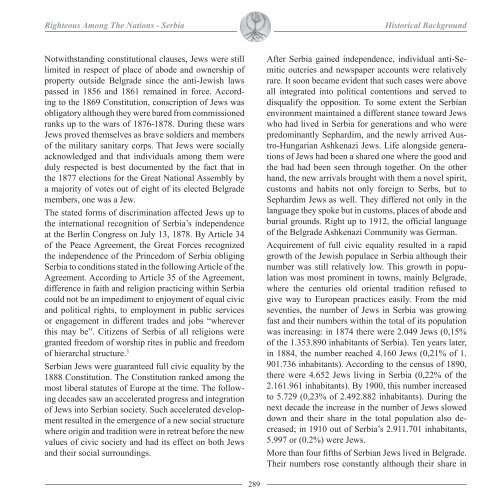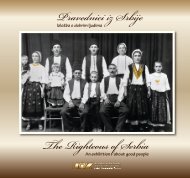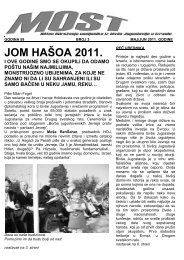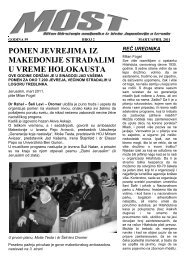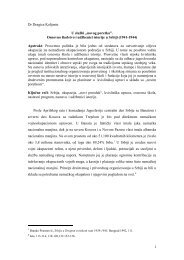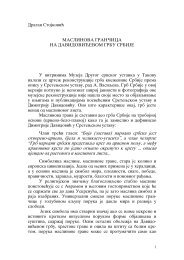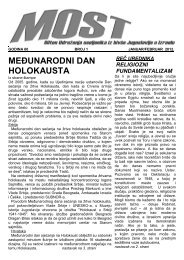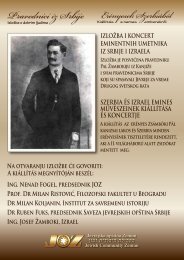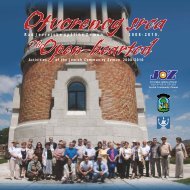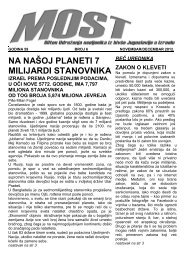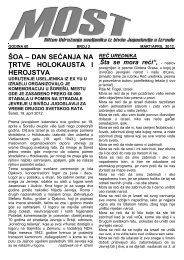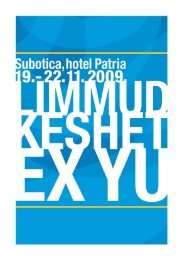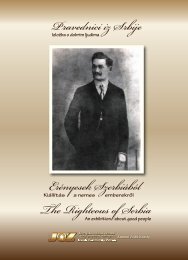Book on the Righteous - Jevrejska opština Zemun
Book on the Righteous - Jevrejska opština Zemun
Book on the Righteous - Jevrejska opština Zemun
You also want an ePaper? Increase the reach of your titles
YUMPU automatically turns print PDFs into web optimized ePapers that Google loves.
<strong>Righteous</strong> Am<strong>on</strong>g The Nati<strong>on</strong>s - Serbia<br />
Historical Background<br />
Notwithstanding c<strong>on</strong>stituti<strong>on</strong>al clauses, Jews were still<br />
limited in respect of place of abode and ownership of<br />
property outside Belgrade since <strong>the</strong> anti-Jewish laws<br />
passed in 1856 and 1861 remained in force. According<br />
to <strong>the</strong> 1869 C<strong>on</strong>stituti<strong>on</strong>, c<strong>on</strong>scripti<strong>on</strong> of Jews was<br />
obligatory although <strong>the</strong>y were bared from commissi<strong>on</strong>ed<br />
ranks up to <strong>the</strong> wars of 1876-1878. During <strong>the</strong>se wars<br />
Jews proved <strong>the</strong>mselves as brave soldiers and members<br />
of <strong>the</strong> military sanitary corps. That Jews were socially<br />
acknowledged and that individuals am<strong>on</strong>g <strong>the</strong>m were<br />
duly respected is best documented by <strong>the</strong> fact that in<br />
<strong>the</strong> 1877 electi<strong>on</strong>s for <strong>the</strong> Great Nati<strong>on</strong>al Assembly by<br />
a majority of votes out of eight of its elected Belgrade<br />
members, <strong>on</strong>e was a Jew.<br />
The stated forms of discriminati<strong>on</strong> affected Jews up to<br />
<strong>the</strong> internati<strong>on</strong>al recogniti<strong>on</strong> of Serbia’s independence<br />
at <strong>the</strong> Berlin C<strong>on</strong>gress <strong>on</strong> July 13, 1878. By Article 34<br />
of <strong>the</strong> Peace Agreement, <strong>the</strong> Great Forces recognized<br />
<strong>the</strong> independence of <strong>the</strong> Princedom of Serbia obliging<br />
Serbia to c<strong>on</strong>diti<strong>on</strong>s stated in <strong>the</strong> following Article of <strong>the</strong><br />
Agreement. According to Article 35 of <strong>the</strong> Agreement,<br />
difference in faith and religi<strong>on</strong> practicing within Serbia<br />
could not be an impediment to enjoyment of equal civic<br />
and political rights, to employment in public services<br />
or engagement in different trades and jobs “wherever<br />
this may be”. Citizens of Serbia of all religi<strong>on</strong>s were<br />
granted freedom of worship rites in public and freedom<br />
of hierarchal structure. 3<br />
Serbian Jews were guaranteed full civic equality by <strong>the</strong><br />
1888 C<strong>on</strong>stituti<strong>on</strong>. The C<strong>on</strong>stituti<strong>on</strong> ranked am<strong>on</strong>g <strong>the</strong><br />
most liberal statutes of Europe at <strong>the</strong> time. The following<br />
decades saw an accelerated progress and integrati<strong>on</strong><br />
of Jews into Serbian society. Such accelerated development<br />
resulted in <strong>the</strong> emergence of a new social structure<br />
where origin and traditi<strong>on</strong> were in retreat before <strong>the</strong> new<br />
values of civic society and had its effect <strong>on</strong> both Jews<br />
and <strong>the</strong>ir social surroundings.<br />
After Serbia gained independence, individual anti-Semitic<br />
outcries and newspaper accounts were relatively<br />
rare. It so<strong>on</strong> became evident that such cases were above<br />
all integrated into political c<strong>on</strong>tenti<strong>on</strong>s and served to<br />
disqualify <strong>the</strong> oppositi<strong>on</strong>. To some extent <strong>the</strong> Serbian<br />
envir<strong>on</strong>ment maintained a different stance toward Jews<br />
who had lived in Serbia for generati<strong>on</strong>s and who were<br />
predominantly Sephardim, and <strong>the</strong> newly arrived Austro-Hungarian<br />
Ashkenazi Jews. Life al<strong>on</strong>gside generati<strong>on</strong>s<br />
of Jews had been a shared <strong>on</strong>e where <strong>the</strong> good and<br />
<strong>the</strong> bad had been seen through toge<strong>the</strong>r. On <strong>the</strong> o<strong>the</strong>r<br />
hand, <strong>the</strong> new arrivals brought with <strong>the</strong>m a novel spirit,<br />
customs and habits not <strong>on</strong>ly foreign to Serbs, but to<br />
Sephardim Jews as well. They differed not <strong>on</strong>ly in <strong>the</strong><br />
language <strong>the</strong>y spoke but in customs, places of abode and<br />
burial grounds. Right up to 1912, <strong>the</strong> official language<br />
of <strong>the</strong> Belgrade Ashkenazi Community was German.<br />
Acquirement of full civic equality resulted in a rapid<br />
growth of <strong>the</strong> Jewish populace in Serbia although <strong>the</strong>ir<br />
number was still relatively low. This growth in populati<strong>on</strong><br />
was most prominent in towns, mainly Belgrade,<br />
where <strong>the</strong> centuries old oriental traditi<strong>on</strong> refused to<br />
give way to European practices easily. From <strong>the</strong> mid<br />
seventies, <strong>the</strong> number of Jews in Serbia was growing<br />
fast and <strong>the</strong>ir numbers within <strong>the</strong> total of its populati<strong>on</strong><br />
was increasing: in 1874 <strong>the</strong>re were 2.049 Jews (0,15%<br />
of <strong>the</strong> 1.353.890 inhabitants of Serbia). Ten years later,<br />
in 1884, <strong>the</strong> number reached 4.160 Jews (0,21% of 1.<br />
901.736 inhabitants). According to <strong>the</strong> census of 1890,<br />
<strong>the</strong>re were 4.652 Jews living in Serbia (0,22% of <strong>the</strong><br />
2.161.961 inhabitants). By 1900, this number increased<br />
to 5.729 (0,23% of 2.492.882 inhabitants). During <strong>the</strong><br />
next decade <strong>the</strong> increase in <strong>the</strong> number of Jews slowed<br />
down and <strong>the</strong>ir share in <strong>the</strong> total populati<strong>on</strong> also decreased;<br />
in 1910 out of Serbia’s 2.911.701 inhabitants,<br />
5.997 or (0.2%) were Jews.<br />
More than four fifths of Serbian Jews lived in Belgrade.<br />
Their numbers rose c<strong>on</strong>stantly although <strong>the</strong>ir share in<br />
289


